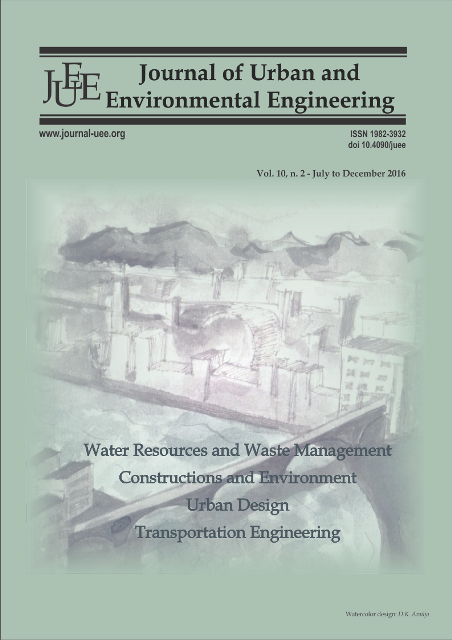CONJUGATE TREATMENT OF LEACHATE FROM LANDFILL AND SEWAGE IN DOMESTIC STABILIZATION PONDS
DOI:
https://doi.org/10.4090/juee.2016.v10n2.155-161Keywords:
wastewater, leachate, biological treatment conjugate, waste biodegradabilityAbstract
In Brazil, the per capita generation of municipal solid waste is approximately 0.80kg.hab-1.day-1, which implies daily production of 156 tons, whereas on average 50% of this quantity of waste is composed mainly of putrescible organic material that will contribute to the leachate generation process directly influencing the qualitative and quantitative aspects. Landfill leachate basically originates from the percolation process of different types of water and is considered a wastewater to cause in significant environmental impact on the environment, given in possession of high concentration of ammonia nitrogen, organic matter difficult to biodegradation, metals heavy and xenobiotics. The objective of this study was to evaluate the performance of a series of stabilization ponds, the treatment process conjugate of landfill leachate fresh more domestic sewage in the proportion of 1 plus 99% (volume percent), respectively. The experimental system consisted of four stabilization ponds in series, being a facultative pond, followed by three maturation ponds. The applied surface charge (λs) the series of stabilization ponds was 320 kgDBO5 . ha-1.day-1 with hydraulic retention time (HRT) of 17 days for the series. The average removal efficiency of BOD5 and ammonia was 69 and 86% respectively, while removing coliform efficiency always in the 99.9% threshold during the monitoring period was 220 days. Overall it can be concluded that treatment conjugate landfill leachate and sewage in stabilization ponds, in northeastern Brazil, is emerging as a promising technological alternative, given the comfortable area availability in northeastern Brazil, conditions climate favorable and the ponds system present low ratio cost / benefit when compared to other waste treatment systems of this nature.Downloads
Download data is not yet available.
Downloads
Published
2017-04-28
Issue
Section
Articles




